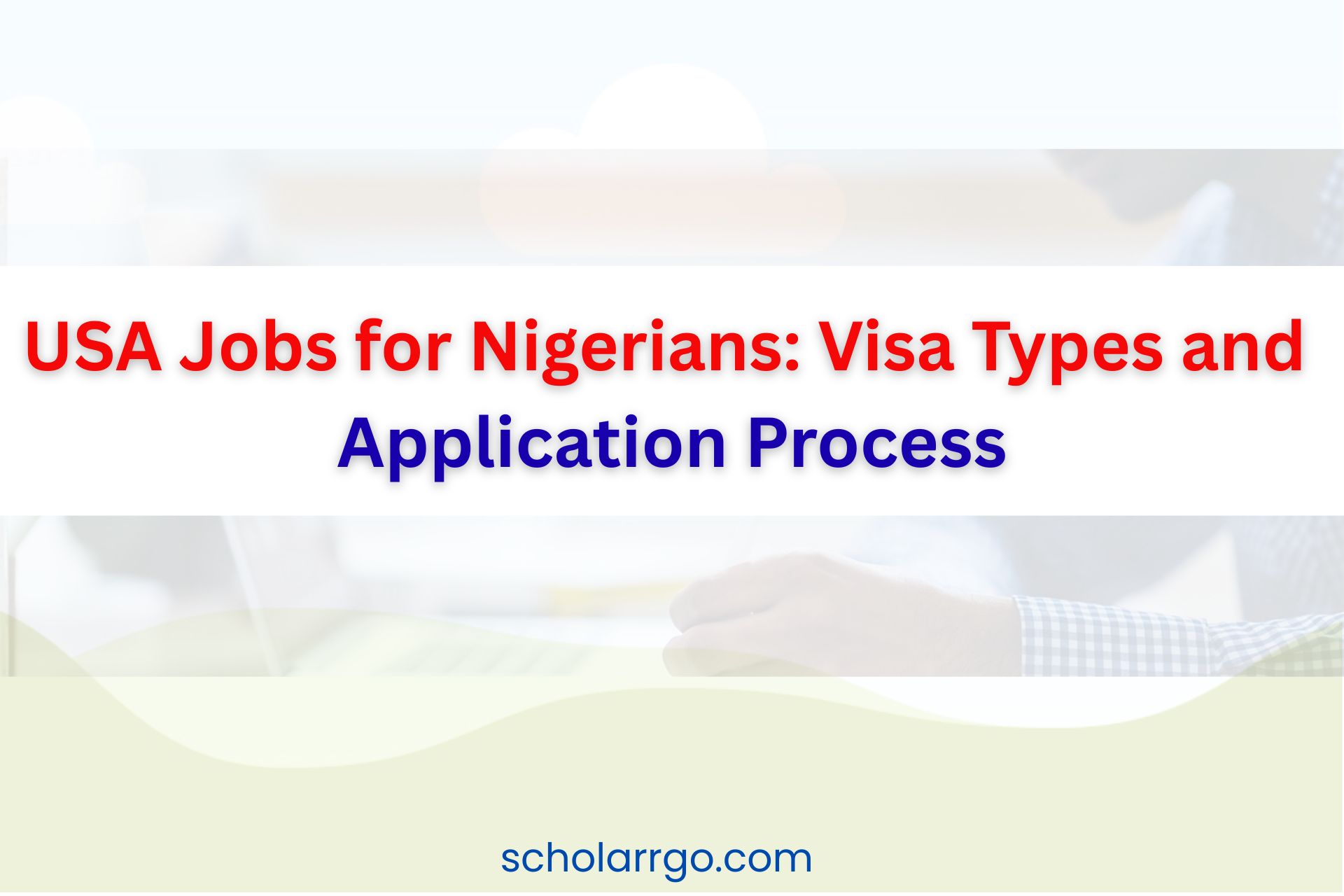If you are a Nigerian seeking job opportunities in the United States? The U.S. is one of the top destinations for skilled professionals, offering numerous job opportunities in healthcare, tech, education, construction, engineering, and more. However, understanding the visa types, job application process, and legal requirements is essential to successfully securing employment.
In this article, we’ll guide you through:
- The top U.S. visa types for Nigerian job seekers
- The step-by-step application process
- Tips for finding jobs that sponsor visas
- Frequently Asked Questions (FAQs)
- A visa comparison table
High Paying Jobs in the U.S. for Nigerians
Many U.S. industries are currently experiencing a shortage of skilled workers, opening up opportunities for qualified foreigners, especially Nigerians with professional or technical skills.
| Industry | Average Salary (USD) | Common Job Roles |
|---|---|---|
| Healthcare | $60,000 – $120,000 | Registered Nurse, Medical Technician |
| Information Technology | $70,000 – $150,000 | Software Developer, Data Analyst |
| Engineering | $65,000 – $130,000 | Civil, Electrical, Mechanical Engrs. |
| Education | $40,000 – $80,000 | Teachers, Lecturers |
| Construction | $35,000 – $75,000 | Project Manager, Mason, Electrician |
Tip: Industries like healthcare and IT have the highest demand and offer more visa sponsorship opportunities.
Top U.S. Visa Types for Nigerians Seeking Employment
1. H-1B Visa – Skilled Workers
- Best for: Professionals in IT, engineering, accounting, finance, etc.
- Requires employer sponsorship
- Valid for 3 years (extendable to 6 years)
- Annual cap of 65,000 (plus 20,000 for Master’s holders)
2. L-1 Visa – Intra-Company Transfer
- Best for: Employees of multinational companies relocating to a U.S. branch
- No labor condition approval required
- Valid for 1 to 3 years (extendable to 7 years)
3. O-1 Visa – Individuals with Extraordinary Ability
- Best for: Artists, athletes, researchers, business experts
- Evidence of international recognition is required
4. J-1 Visa – Exchange Visitors
- Best for: Interns, trainees, teachers, and researchers
- Includes work and study components
- Often sponsored by U.S. government or approved institutions
5. EB-3 Visa – Employment-Based Green Card
- Best for: Skilled, unskilled, or professional workers
- Leads to permanent residence
- Requires employer sponsorship and PERM labor certification
Visa Type Comparison Table
| Visa Type | Sponsored by Employer | Validity Period | Leads to Green Card | Who Can Apply? |
|---|---|---|---|---|
| H-1B | Yes | 3 to 6 years | Yes (via EB-2/3) | Professionals in specialty fields |
| L-1 | Yes | 1 to 7 years | Yes | Intra-company transferees |
| O-1 | Yes | 3 years (renewable) | Yes | Individuals with exceptional skills |
| J-1 | Sometimes | Program-based | No (some exceptions) | Exchange visitors |
| EB-3 | Yes | Permanent | Yes | Skilled/unskilled workers |
How to Apply for U.S. Jobs from Nigeria
Here’s a step-by-step breakdown of the process Nigerian job seekers can follow:
Step 1: Prepare Your Documents
Ensure your documents are professionally updated:
- CV/Resume (American style)
- Academic credentials
- Professional licenses
- Work references
- International passport
Step 2: Find U.S. Employers That Sponsor Visas
Use trusted websites like:
- LinkedIn Jobs
- Indeed.com
- MyVisaJobs.com
- H1BGrader.com
- CareerJet.com.ng
Search using keywords like:
“H-1B visa sponsorship jobs in USA”
“Jobs in USA for foreign workers”
“Tech jobs in USA for Nigerians”
Step 3: Apply for the Job
Tailor your resume and cover letter for each application. Follow American business etiquette—be concise and professional.
Step 4: Attend Online Interviews
Use Zoom, Google Meet, or Microsoft Teams. Make sure you have a quiet background, stable internet, and a working webcam.
Step 5: Get the Job Offer & Visa Sponsorship
Once selected, the U.S. employer will:
- File a Labor Condition Application (LCA) with the Department of Labor
- Petition USCIS for your visa (Form I-129 for H-1B)
- Receive an approval notice (Form I-797)
Step 6: Apply for the U.S. Work Visa at the U.S. Embassy in Nigeria
Book your interview at the U.S. Embassy in Abuja or Lagos:
- Pay the visa application fee (approx. $190 for H-1B)
- Submit DS-160 form
- Attend visa interview
- Await visa stamping in your passport
Common Mistakes to Avoid
- Applying for jobs without checking if the employer offers visa sponsorship
- Submitting generic resumes/CVs
- Using non-American date or spelling formats
- Falling for job scams or “visa agents” demanding upfront payments
- Not verifying job offers on official platforms
Frequently Asked Questions (FAQs)
1. Can I get a job in the U.S. without sponsorship?
Generally, no. Most jobs for foreigners require a visa that must be sponsored by an employer. Exceptions include family-based immigration or Diversity Visa Lottery (DV).
2. What’s the easiest way for a Nigerian to work in the U.S.?
The H-1B visa is the most common route for skilled professionals. However, if you qualify for the DV lottery or marry a U.S. citizen, that can also provide work eligibility.
3. How much is the visa application fee in Nigeria?
Visa fees range from $160 to $265 depending on the visa type. H-1B typically costs $190 (for the applicant).
4. Do U.S. employers really hire Nigerians?
Yes! Many Nigerians have been successfully employed in the U.S., especially in tech, healthcare, and education sectors. Your skillset, credentials, and English proficiency are strong assets.
5. How long does it take to process a U.S. work visa?
Processing time varies:
- H-1B: 3–6 months (premium processing in 15 days)
- EB-3: 1–2 years
- J-1: 1–3 months
Summary
Getting a job in the U.S. as a Nigerian is possible—but it requires preparation, patience, and persistence. Focus on upgrading your skills, applying to verified employers, and ensuring all your documents are in order. Always avoid fraudsters who promise guaranteed jobs or visas.
